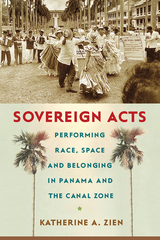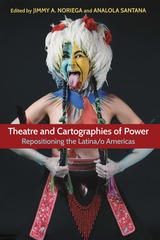3 books by Zien, Katherine

Bodies on the Front Lines
Performance, Gender, and Sexuality in Latin America and the Caribbean
Brenda Werth and Katherine Zien, Editors
University of Michigan Press, 2024
Revolutionary feminisms and queer and trans activist movements are traversing Latin America and the Caribbean. Bodies on the Front Lines situates recent performances and protest actions within legacies of homegrown gender and sexual rights activism from the South. Performances — enacted in public spaces and intimate venues, across national borders, and through circulating hashtags and digital media — play crucial roles in the elaboration, auto-theorization, translation, and reception of feminist, queer, and trans activism. Movements such as Argentina's NiUnaMenos (Not One Less) have brought together hundreds of thousands of protesters and ‘artivists’ on the streets of major cities in Latin America and beyond to denounce gender violence and demand gender, sexual, and reproductive rights.
The volume’s contributors draw from rich legacies of theater, performance, and activism in the region, as well as decolonial and intersectional theorizing, to demonstrate the ways that performance practices enable activists to sustain their movements. The chapters engage diverse perspectives from Argentina, Brazil, Bolivia, Chile, Colombia, Cuba, the Dominican Republic, transnational Central America, Peru, Puerto Rico, and Mexico.
Rather than taking an approach that simplifies complexities among states, Bodies on the Front Lines takes seriously the geopolitical stakes of examining Latin America and the Caribbean as a heterogeneous site of nations and networks. In chapters covering this wide geographical area, leading scholars in the fields of theater and performance studies showcase the aesthetic, social, and political work of performance in generating and fortifying gender and sexual activism in the Americas.
The volume’s contributors draw from rich legacies of theater, performance, and activism in the region, as well as decolonial and intersectional theorizing, to demonstrate the ways that performance practices enable activists to sustain their movements. The chapters engage diverse perspectives from Argentina, Brazil, Bolivia, Chile, Colombia, Cuba, the Dominican Republic, transnational Central America, Peru, Puerto Rico, and Mexico.
Rather than taking an approach that simplifies complexities among states, Bodies on the Front Lines takes seriously the geopolitical stakes of examining Latin America and the Caribbean as a heterogeneous site of nations and networks. In chapters covering this wide geographical area, leading scholars in the fields of theater and performance studies showcase the aesthetic, social, and political work of performance in generating and fortifying gender and sexual activism in the Americas.
[more]

Sovereign Acts
Performing Race, Space, and Belonging in Panama and the Canal Zone
Zien, Katherine A.
Rutgers University Press, 2017
Winner of the 2018 Gordon K. and Sybil Farrell Lewis Book Prize from the Caribbean Studies Association
Winner of the 2017 Annual Book Prize from the Canadian Association of Latin American and Caribbean Studies (CALACS)
Sovereign Acts explores how artists, activists, and audiences performed and interpreted sovereignty struggles in the Panama Canal Zone, from the Canal Zone’s inception in 1903 to its dissolution in 1999. In popular entertainments and patriotic pageants, opera concerts and national theatre, white U.S. citizens, West Indian laborers, and Panamanian artists and activists used performance as a way to assert their right to the Canal Zone and challenge the Zone’s sovereignty, laying claim to the Zone’s physical space and imagined terrain.
By demonstrating the place of performance in the U.S. Empire’s legal landscape, Katherine A. Zien transforms our understanding of U.S. imperialism and its aftermath in the Panama Canal Zone and the larger U.S.-Caribbean world.
Winner of the 2017 Annual Book Prize from the Canadian Association of Latin American and Caribbean Studies (CALACS)
Sovereign Acts explores how artists, activists, and audiences performed and interpreted sovereignty struggles in the Panama Canal Zone, from the Canal Zone’s inception in 1903 to its dissolution in 1999. In popular entertainments and patriotic pageants, opera concerts and national theatre, white U.S. citizens, West Indian laborers, and Panamanian artists and activists used performance as a way to assert their right to the Canal Zone and challenge the Zone’s sovereignty, laying claim to the Zone’s physical space and imagined terrain.
By demonstrating the place of performance in the U.S. Empire’s legal landscape, Katherine A. Zien transforms our understanding of U.S. imperialism and its aftermath in the Panama Canal Zone and the larger U.S.-Caribbean world.
[more]

Theatre and Cartographies of Power
Repositioning the Latina/o Americas
Edited by Jimmy A. Noriega and Analola Santana
Southern Illinois University Press, 2018
From the colonial period to independence and into the twenty-first century, Latin American culture has been mapped as a subordinate “other” to Europe and the United States. This collection reconsiders geographical space and power and the ways in which theatrical and performance histories have been constructed throughout the Americas. Essays bridge political, racial, gender, class, and national divides that have traditionally restricted and distorted our understanding of Latin American theatre and performance. Contributors—scholars and artists from throughout the Americas, including well-known playwrights, directors, and performers—imagine how to reposition the Latina/o Americas in ways that offer agency to its multiple peoples, cultures, and histories. In addition, they explore the ways artists can create new maps and methods for their creative visions.
Building on hemispheric and transnational models, this book demonstrates the capacity of theatre studies to challenge the up-down/North-South approach that dominates scholarship in the United States and presents a strong case for a repositioning of the Latina/o Americas in theatrical histories and practices.
Building on hemispheric and transnational models, this book demonstrates the capacity of theatre studies to challenge the up-down/North-South approach that dominates scholarship in the United States and presents a strong case for a repositioning of the Latina/o Americas in theatrical histories and practices.
[more]
READERS
Browse our collection.
PUBLISHERS
See BiblioVault's publisher services.
STUDENT SERVICES
Files for college accessibility offices.
UChicago Accessibility Resources
home | accessibility | search | about | contact us
BiblioVault ® 2001 - 2024
The University of Chicago Press









